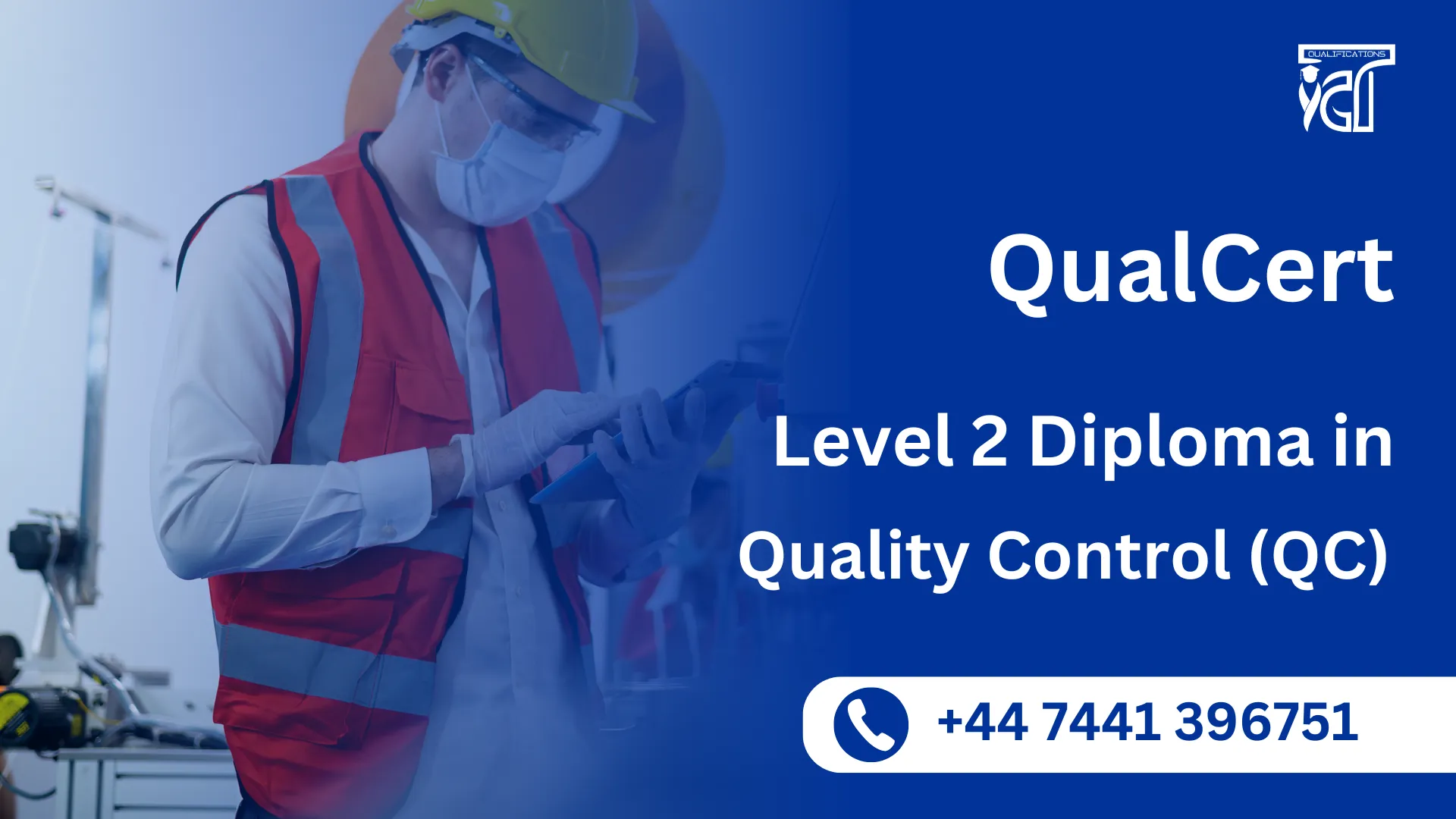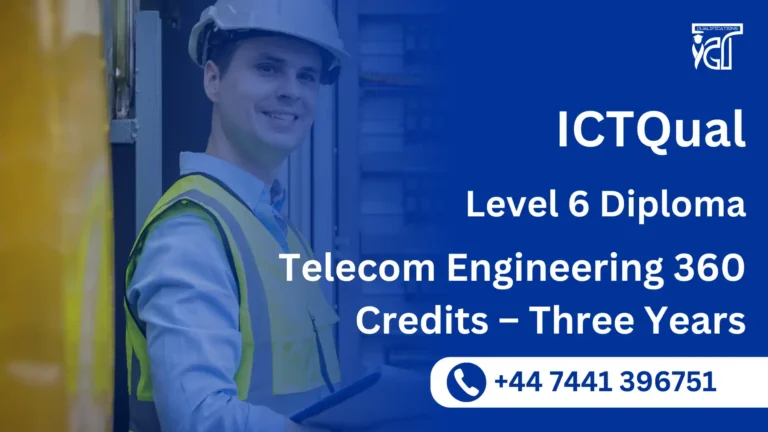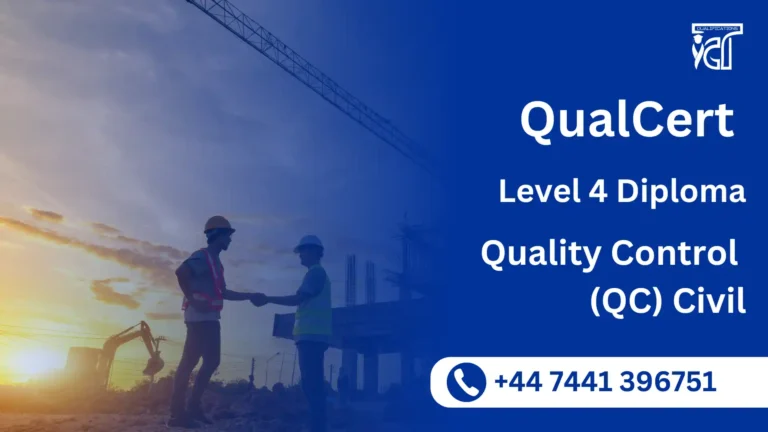In an increasingly competitive and quality-focused global economy, the ability to ensure consistent product and service standards is more vital than ever. Businesses across all sectors are actively seeking professionals skilled in quality control to help maintain compliance, improve operational efficiency, and deliver customer satisfaction.
The QualCert Level 2 Diploma in Quality Control (QC) is a comprehensive, Ofqual-regulated qualification designed for individuals aspiring to build a career in quality management. Whether you’re entering the workforce, looking to upskill, or seeking a formal certification in QC, this diploma provides the knowledge and practical tools to succeed in today’s quality-driven industries.
The QualCert Level 2 Diploma in Quality Control offers an in-depth introduction to the key concepts, processes, and techniques involved in quality control across a wide range of sectors. This course is fully assignment-based and provides a practical, hands-on approach to quality assurance that is directly applicable in the workplace.
Accredited by Ofqual, this diploma is trusted by employers worldwide and adds credibility to your professional profile.The course focuses on real-world skills that can be applied immediately in quality-focused roles across various industries.This qualification opens doors to roles in manufacturing, pharmaceuticals, engineering, food safety, and logistics, where quality control is essential.
The QualCert Level 2 Diploma in Quality Control (QC) offers an excellent starting point for individuals who want to establish a career in quality management. With practical, industry-relevant training and the backing of an Ofqual-regulated awarding body, this qualification not only enhances your professional skillset but also significantly boosts your career prospects in today’s quality-conscious world.
QualCert Level 2 Diploma in Quality Control (QC)
This QualCert Level 2 Diploma in Quality Control (QC) course offers 30 Credits, requiring a Total Qualification Time (TQT) of 300 hours, including 150 Guided Learning Hours (GLH). It is designed for efficient and focused skill development in Quality Control (QC).
| Unit Ref# | Unit Title | Credit | GLH | TQT |
| QC01006 – 1 | Quality Management Systems | 5 | 25 | 50 |
| QC01006 – 2 | Advanced Earthworks QC | 5 | 25 | 50 |
| QC01006 – 3 | Documentation and Regulatory Compliance | 5 | 25 | 50 |
| QC01006 – 4 | QC for Green Infrastructure | 5 | 25 | 50 |
| QC01006 – 5 | Testing and Certification Processes | 5 | 25 | 50 |
| QC01006 – 6 | Audit Techniques and Sustainability Strategies | 5 | 25 | 50 |
GLH (Guided Learning Hours) and TQT (Total Qualification Time) are terms commonly used in vocational qualifications to help define the amount of time a learner is expected to spend on their studies.
1. GLH (Guided Learning Hours)
GLH refers to the number of hours a learner spends being directly taught, supervised, or supported during their course. This includes the time spent in activities such as:
- Classroom instruction
- Practical workshops
- One-on-one tutoring or mentoring sessions
- Online learning sessions with tutor support
In other words, GLH represents the time that learners are actively engaged with their instructors or learning activities.
2. TQT (Total Qualification Time)
TQT represents the total amount of time a learner is expected to invest in completing a qualification, including:
- GLH (Guided Learning Hours): Time spent on direct learning, as explained above.
- Self-Directed Learning: This includes time spent on independent study, research, assignment completion, preparation for exams, and any other work the learner does outside of direct teaching hours.
TQT is a broader measure that includes all the time required to achieve the qualification. It helps learners and employers understand the overall commitment required for the qualification.
Key Differences Between GLH and TQT:
- GLH focuses on direct learning with guidance or supervision.
- TQT includes GLH as well as independent study time and other learning-related activities.
Example:
If a qualification has a TQT of 600 hours and a GLH of 250 hours, it means the learner should spend 250 hours in direct learning (classroom, online, or tutor-led sessions) and 350 hours on independent study or research.
Upon successful completion of the Level 2 Diploma in Quality Control, participants can expect to achieve the following learning outcomes:
Quality Management Systems
- Understand the fundamental principles and components of quality management systems (QMS).
- Demonstrate the ability to implement and maintain QMS in line with industry standards such as ISO 9001.
- Identify key performance indicators (KPIs) and monitor quality processes effectively.
- Develop strategies for continuous improvement within a quality management framework.
Advanced Earthworks QC
- Gain a thorough understanding of quality control practices specific to earthworks and infrastructure projects.
- Apply soil testing, compaction monitoring, and grading techniques to meet regulatory standards.
- Recognize and address environmental challenges and constraints in earthworks projects.
- Ensure compliance with health, safety, and environmental guidelines in large-scale earthworks.
Documentation and Regulatory Compliance
- Acquire the skills to prepare and maintain accurate documentation required for quality control and audits.
- Understand the legal and regulatory requirements relevant to quality control in various industries.
- Develop a systematic approach to ensure compliance with national and international quality standards.
- Implement effective record-keeping and reporting practices to support organizational accountability.
QC for Green Infrastructure
- Understand the principles and practices of quality control specific to green infrastructure projects.
- Apply sustainability-focused methodologies in the planning, execution, and monitoring of projects.
- Ensure compliance with environmental certifications such as LEED or BREEAM.
- Evaluate the performance and longevity of green infrastructure solutions.
Testing and Certification Processes
- Gain proficiency in various testing techniques used in quality assurance processes across industries.
- Understand the certification requirements and procedures to meet industry and product standards.
- Conduct material, product, and performance testing to ensure quality compliance.
- Collaborate with certifying bodies to ensure smooth certification processes.
Audit Techniques and Sustainability Strategies
- Understand the purpose and scope of quality audits in identifying gaps and improvement opportunities.
- Develop audit planning, execution, and reporting skills to ensure effective quality assessments.
- Integrate sustainability strategies into quality control processes and organizational practices.
- Evaluate and improve sustainability metrics in alignment with corporate social responsibility goals.
Benefits of the QualCert Level 2 Diploma in Quality Control (QC)
1. Ofqual-Regulated & Globally Recognized
This diploma is accredited by Ofqual, the UK’s official regulator for qualifications, ensuring international recognition and trust from employers across industries.
2. Comprehensive Foundation in Quality Control
Gain a solid understanding of core quality control principles, tools, and industry standards. The course prepares learners to confidently manage inspection processes and support quality assurance in real-world settings.
3. 100% Assignment-Based Learning
No exams! The course is fully assignment-driven, offering a practical and hands-on learning experience that allows learners to apply what they’ve studied directly to their workplace.
4. Ideal for Career Starters and Career Changers
Whether you’re new to the workforce or transitioning from another field, this Level 2 diploma provides the essential skills and knowledge needed to enter or progress in quality-related roles.
5. Increased Employability
Quality control professionals are in demand across multiple sectors including:
- Manufacturing
- Food Production
- Pharmaceuticals
- Engineering
- Logistics & Warehousing
This qualification enhances your profile and opens the door to entry-level and supervisory roles.
6. Flexible Online Study Format
Study at your own pace, from anywhere in the world. The flexible e-learning structure is perfect for working professionals, part-time learners, or those balancing other responsibilities.
7. Enhances Workplace Efficiency and Compliance
Equip yourself with the skills to help your organization reduce errors, maintain standards, and comply with industry regulations, adding immediate value to your role.
8. Supports Career Progression
Completing this diploma qualifies you to move on to higher-level qualifications, such as:
- Level 3 Certificate or Diploma in Quality Control
- ISO 9001 Internal Auditor Training
- Advanced diplomas in Compliance, QA, or Risk Management
9. Builds Technical and Analytical Skills
You’ll learn to use common quality control tools such as control charts, Pareto analysis, and root cause analysis—essential skills for maintaining and improving quality systems.
10. Boosts Professional Confidence
With industry-standard knowledge and a recognized qualification, you’ll gain the confidence to contribute effectively to quality assurance discussions, audits, and continuous improvement initiatives.
The Level 2 Diploma in Quality Control is intended for a diverse audience of individuals who aspire to advance their careers in quality control, quality assurance, or related fields. This course is suitable for:
- Aspiring Quality Control Specialists, Engineers, and Managers
- Quality Control Technicians and Inspectors Seeking Advanced Skills
- Quality Assurance Professionals Expanding Their Knowledge
- Managers and Supervisors Overseeing Quality Control Teams
- Process Improvement Practitioners Integrating Quality Control
- Recent Graduates in Engineering and Related Fields
- Industry Professionals in Quality-Critical Sectors
- Entrepreneurs and Small Business Owners
- Continuous Improvement Enthusiasts
- Individuals Seeking Career Advancement in Quality-Related Roles
Entry Requirements
Register Now
Qualification Process
Qualification Process for the QualCert Level 2 Diploma in Quality Control (QC)
- Self-Assessment:
Begin by evaluating your eligibility to ensure you meet the qualification requirements, including work experience, knowledge, and language proficiency. - Registration:
Complete your registration by submitting the required documents, including a scanned copy of a valid ID, and paying the registration fee. - Induction:
An assessor will conduct an induction to confirm your eligibility for the course and explain the evidence requirements. If you do not meet the criteria, your registration will be canceled, and the fee will be refunded. - Assignmnets & Evidence Submission:
Provide all assignmnets and the necessary evidence based on the assessment criteria outlined in the course. If you are unsure of the required evidence, consult with the assessor for guidance on the type and nature of evidence needed. - Feedback and Revision:
The assessor will review your submitted evidence and provide feedback. Evidence that meets the criteria will be marked as “Criteria Met,” while any gaps will be identified. You will be asked to revise and resubmit if needed. - Competence Evidence:
Submit final evidence demonstrating that all learning outcomes have been met. This evidence will be marked as “Criteria Met” by the assessor once it is satisfactory. - Internal Quality Assurance (IQA):
The Internal Quality Assurance Verifier (IQA) will review your evidence to ensure consistency, quality, and compliance with standards. - External Verification:
The IQA will submit your portfolio to QualCert External Quality Assurance Verifiers (EQA) for final confirmation. The EQA may contact you directly to verify the authenticity of your evidence. - Certification:
Upon successful completion of all checks, QualCert will issue your official certificate, confirming that you have attained the QualCert Level 2 Diploma in Quality Control (QC).







